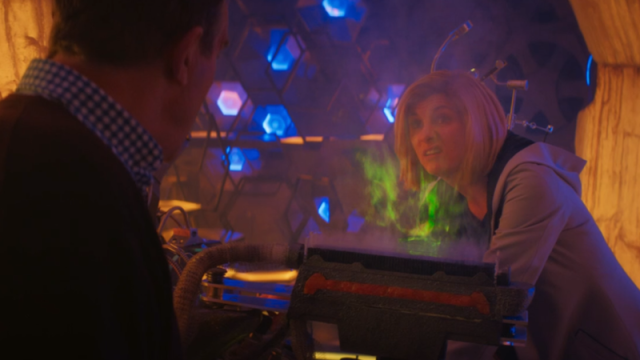The latest episode of Doctor Who tackled mental health struggles through the lens of a fight against eternal, godlike beings who fed off the traumatic fears of the mortal realm. But it ended with a scene between the Doctor and one of her companions that has left some fans deeply disappointed—and the BBC has had to offer an official response to complaints.
The moment that’s caused concern comes in the final scene of “Can You Hear Me?” Throughout the episode, the Doctor and her companions were forced to face some of their deepest traumas, as eternal beings Zellin and Rakaya (guest stars Ian Gelder and Clare-Hope Ashitey) fed off of their mental anguish. Ryan and Yaz were confronted with fears of abandonment and bullying, but Graham, played by Bradley Walsh, was hit with a two-fold nightmare: facing conflicted feelings about the death of his wife Grace—who died when he, Ryan, and Yaz first met the Doctor last season—as well as lingering feelings that, as a cancer survivor, the disease may one day return in spite of what his regular health check-ups tell him.
[referenced url=” thumb=” title=” excerpt=”]
By the end of the episode, Zellin and Rakaya are defeated, but it’s clear that re-experiencing these traumas has enacted a toll on the Doctor’s friends, especially Graham. In the final scene, he emotionally confides in the Doctor his fears over his cancer’s potential return, and how much the prospect of battling that disease—not just a second time, but without the support of his wife—scares him.
The Doctor’s response is to lightly acknowledge that she is socially awkward and knows she should say something to comfort him, but will instead choose to walk away, tinker at the TARDIS console, and merely think of the comforting thing she should’ve said, moments later. The scene pulls away from them and the episode ends shortly after, so we’re left unaware if the Doctor ever actually said those words of comfort to Graham out loud.
If you’ve been affected by any of the issues in tonight’s #DoctorWho, see what further resources are available here ???? https://t.co/0HZTMb9NYv pic.twitter.com/cqgAO31eQh
— Doctor Who Official (@bbcdoctorwho) February 9, 2020
Considering the episode’s wider messaging around mental health—and especially the importance of networks that let people openly acknowledge their struggles while offering support—was a major part of the episode (in the UK, the broadcast even ended with a continuity announcer providing material for people affected by the conversations in the episode, something Doctor Who’s official Twitter account also linked to) it’s a moment that can come across as incredibly indelicate. And has done so, to the point that after enough complaints were made to the BBC’s official complaints office, the broadcaster released a statement acknowledging viewer concerns.
“We never set out to upset our viewers with what we show and this episode tackled some sensitive themes,” the statement provided to filed complaints, verified by the Radio Times, begins. “The episode used dreams and nightmares to explore the inner lives of the companions. Thanks to Zellin’s nightmare powers, Ryan, Yaz, and Graham were forced to confront their worst fears, many of which relate to the way travelling with the Doctor has changed their lives. When Graham opened up to the Doctor about his fear of his cancer returning her response was never meant to be dismissive. The Doctor’s friend was scared, and we see her struggling to deal with the severity of the situation.”
“The intention of the scene was to acknowledge how hard it can be to deal with conversations on this subject matter,” the BBC statement continued. “When faced with these situations, people don’t always have the right words to say at the right time, and this can often lead to feelings of guilt. By showing the Doctor struggling to find the right words, the intention was to sympathise with all those who may have found themselves in a similar position.”
While the intent might have been to provide a circumstance in which people don’t always have the right answer in tough conversations like the one between the Doctor and Graham, there were arguably much better ways to portray that than having the Doctor—a hero often defined by their compassion—so casually, almost jokingly, announce her inability to be compassionate for Graham in this moment. Hopefully in the future Doctor Who will find ways to examine the Doctor’s alienness in social settings without missing the mark in the way it did here.
